少儿英语小短文带翻译:替猫戴上铃铛
替猫带上铃铛
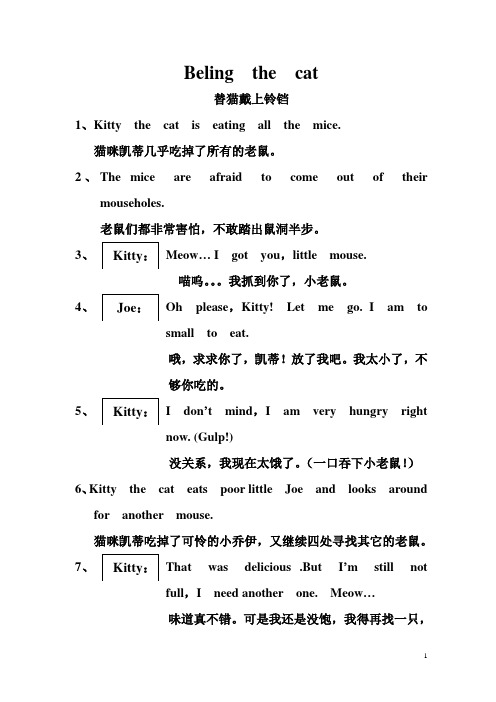
Beling the cat替猫戴上铃铛1、Kitty the cat is eating all the mice.猫咪凯蒂几乎吃掉了所有的老鼠。
2、The mice are afraid to come out of their mouseholes.老鼠们都非常害怕,不敢踏出鼠洞半步。
3、 Meow … I got you ,little mouse.喵呜。
我抓到你了,小老鼠。
4、Oh please ,Kitty! Let me go. Iam tosmall to eat.哦,求求你了,凯蒂!放了我吧。
我太小了,不够你吃的。
5、I don ’t mind ,I am very hungry rightnow. (Gulp!)没关系,我现在太饿了。
(一口吞下小老鼠!)6、Kitty the cat eats poor little Joe and looks around for another mouse.猫咪凯蒂吃掉了可怜的小乔伊,又继续四处寻找其它的老鼠。
7、 That was delicious .But I ’m still notfull ,I need another one. Meow …味道真不错。
可是我还是没饱,我得再找一只,喵呜。
1、Lenny and Theodore are also mice ,they seeeverything.蓝尼和西奥多也是老鼠,他们目睹了这一切。
2、Did you see that, Theodore?你看到了吗,西奥多?3、 I sure did, Lenny, it was terrible.我看到了,蓝尼,太恐怖了。
4、Kitty is getting fatter and fatter everyday.凯蒂一天比一天胖。
5、 She is eatingmore and more , soonshe will eat allof us.她越吃越多,很快她就会把我们都吃光。
小野猫把铃铛英文理解文言文的作文
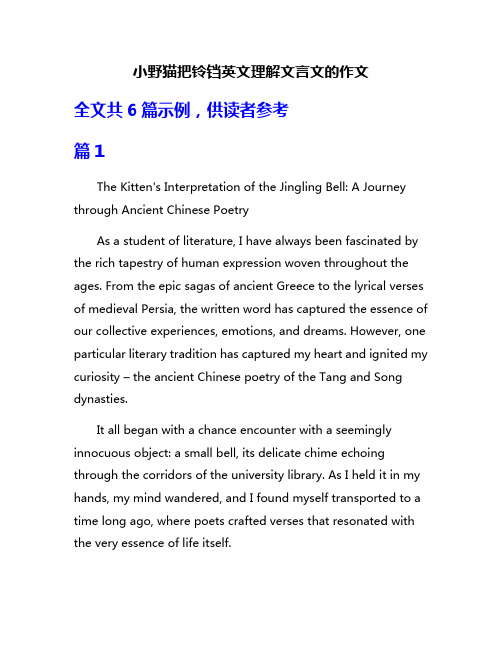
小野猫把铃铛英文理解文言文的作文全文共6篇示例,供读者参考篇1The Kitten's Interpretation of the Jingling Bell: A Journey through Ancient Chinese PoetryAs a student of literature, I have always been fascinated by the rich tapestry of human expression woven throughout the ages. From the epic sagas of ancient Greece to the lyrical verses of medieval Persia, the written word has captured the essence of our collective experiences, emotions, and dreams. However, one particular literary tradition has captured my heart and ignited my curiosity – the ancient Chinese poetry of the Tang and Song dynasties.It all began with a chance encounter with a seemingly innocuous object: a small bell, its delicate chime echoing through the corridors of the university library. As I held it in my hands, my mind wandered, and I found myself transported to a time long ago, where poets crafted verses that resonated with the very essence of life itself.One such poet, whose name has been etched into the annals of Chinese literature, is Bai Juyi, a renowned writer of the Tang Dynasty. His poem, "The Song of the Peddler," has captured the imagination of scholars and laymen alike, with its vivid portrayal of a humble street vendor and the profound musings on the transience of life.As I delved deeper into Bai Juyi's work, I found myself drawn to the intricate tapestry of imagery and symbolism that wove through his verses. The jingling bell, a seemingly mundane object, took on a life of its own, becoming a metaphor for the fleeting nature of existence, a constant reminder of the impermanence that surrounds us.Bai Juyi's mastery of language was not limited to the realm of the tangible; he also explored the intangible realms of human emotion and spirituality. In his poem "Song of the Lute," the humble instrument becomes a vessel for the expression of love, longing, and the yearning for transcendence. The strings vibrate, and the notes dance, carrying the weight of a thousand unspoken desires, echoing through the ages like a whisper on the wind.Yet, it was not only the Tang poets who captured my imagination; the Song Dynasty poets, too, left an indelible markon my literary journey. Su Shi, a revered scholar and poet of the era, wove intricate tapestries of words that spoke to the human condition with a depth and clarity that transcended temporal boundaries.In his poem "Remembering the Past at the Old Monastery," Su Shi invites the reader to embark on a journey of self-reflection, where the past and present intertwine, and the boundaries between the physical and spiritual realms blur. The jingling bell, once again, serves as a metaphorical guide, its gentle chime echoing through the verses like a beacon, illuminating the path to self-discovery.As I immersed myself in these ancient works, I found myself drawn not only to the beauty of the language but also to the profound wisdom that lay beneath the surface. These poets were not mere wordsmiths; they were philosophers, sages, and observers of the human condition, capturing the essence of life in all its complexity and beauty.Through their words, I learned to appreciate the fleeting nature of existence, the power of love and longing, and the importance of self-reflection and spiritual growth. The jingling bell, once a simple object, became a symbol of the cyclical natureof life, reminding me that even the most seemingly insignificant moments can hold profound truths.As I sit here, the bell still in my hands, I am filled with a sense of awe and gratitude for the literary legacy that has been passed down through the ages. These ancient poets have not only enriched my understanding of language and literature but have also imparted valuable lessons about the human experience, lessons that continue to resonate in the modern world.In a world that often moves at a relentless pace, where the pursuit of material wealth and fleeting pleasures can consume us, the ancient Chinese poets remind us to pause, to reflect, and to appreciate the beauty that surrounds us. Their words are a gentle whisper, a call to embrace the present moment and to find solace in the eternal truths that have endured through the centuries.As I embark on my own literary journey, I carry with me the wisdom and insights gleaned from these ancient poets, their words serving as a guiding light, a constant reminder to stay true to my path, to embrace the complexities of life, and to find beauty in the most unexpected places.The jingling bell, once a mere curiosity, has now become a cherished companion, a symbol of the profound and enduringlegacy of Chinese poetry, a legacy that continues to inspire and enlighten, transcending the boundaries of time and space.篇2The Kitten with the Bell: Translating a Children's Tale into Classical ChineseWhen I was first assigned the task of translating the beloved children's story "The Kitten with the Bell" into classical Chinese, I must admit I was a bit daunted. Classical Chinese, with its vast lexicon of obscure logograms and nuanced grammar rules, seemed like a herculean challenge for someone still mastering the modern vernacular. However, as I delved into the source material and brushed up on my classical Chinese, I found the process to be immensely rewarding from both a linguistic and creative standpoint.For the unfamiliar, "The Kitten with the Bell" is a simple yet charming tale about a mischievous kitten who keeps getting into trouble. To remedy the situation, its owner ties a little bell around the kitten's neck so he can keep track of its whereabouts. At first, the kitten delights in the novelty of the jingling bell. But before long, the incessant ringing becomes an annoyance, impeding its ability to sneak up on birds and mice. The storyculminates with the kitten finally ridding itself of the burdensome bell, only to immediately miss the pleasant tinkling sound. It's a light-hearted narrative with universal themes about curiosity, freedom, and appreciating the little things.My first major hurdle was determining the appropriate classical Chinese register and style to employ. Classical Chinese boasts numerous archaic vernaculars ranging from the lapidary classics to the ornate parallels of the Tang era. For a children's fable, I decided a more conversational, anecdotal tone akin to the philosophies of Zhuangzi would best capture the story's playful spirit while remaining comprehensible to learners.I chose to render the title as 鈴鐺小猫(linglingxiaomao), using the vivid compound 鈴鐺("bell-tinkling") to immediately conjure the sound at the heart of the tale. The opening passage introduced our feline protagonist as 慓悍輲躘之猫(a "rascally and rambunctious cat") who would oft'Times gallivant about 翶翔嬉戱("flitting and frolicking") to its owner's chagrin.Depicting the kitten's actions proved particularly fun and rewarding. I strove to inscribe each scene with delightfully quirky classic vocabulary, like describing the kitten's botched hunt with �opt'tCM:>d>_3',@uuv>vF2=Cg,Z.ib&yU6e^9T#lP(O]aPYYE=w &X8Ey_1PW&F/WI&Xk_0X:'Q%K@9;hTo5jC2F[;f\Z?Qb乂囫圇�owledgean ("bewilderedly pacing round and round") when its prey escaped. When rendering dialogue, I borrowed rhetorical gambitssuch as 大賭恥之("taking umbrage at the ignoble bind...") to give the owner a crotchety, apoplectic air.But my favorite passages to translate were the bittersweet final scenes of the kitten first becoming vexed by thejinglingbell — described as 隨跱㢘,鈴疲陔("its every hop and bound triggering clamorous peals") — only to then ruefully realize 彷徨無聲,實喪心緖("forlorn in the stillness, longing for the tinkle that once vexed"). I found classical Chinese exceptionally well-suited to capture the irony and wisdom lurking beneath a seemingly innocuous kids' story.There were also debates over certain word choices; for instance, whether to use the generic 獸("beast") or specifically 雀("sparrows") when describing the kitten's prey. I ultimately elected for the latter to enhance the feeling of the kittenspecifically hunting sprightly little birds.Despite such speed bumps, the experience of translating this children's classic proved immensely edifying. It deepened my appreciation for the narrative economy and evocative vocabulary of Classical Chinese. It challenged me to imbue modern storytelling with poetic Chinese conceits and allegories. Most ofall, it was a thoroughly enjoyable creative exercise, alchemy of cultural exchange wrought through linguistic translation.While my rendition is surely imperfect, filled with solecisms that would make a classical scholar blanch, I can at least take pride in resurrecting this simple yet profound tale of feline misadventure in the revered argot of master scholars and imperial courtiers. To clumsily rework a classic aphorism: Could there be any greater joy than introducing the dulcet ringing of 鈴鐺小猫to the hallowed lingua of Zhuangzi and Confucius?篇3A Curious Kitten's Comical MistakeAs a young student of literature, I have had the opportunity to study various forms of written expression, ranging from the simplest nursery rhymes to the most complex philosophical treatises. However, one particular work has recently captured my imagination in a way that few others have – the ancient Chinese poem "A Kitten Mistakes a Bell for a Prey Item."At first glance, this poem may seem like a mere trifle, a whimsical tale of feline folly that serves little purpose beyond providing a brief moment of amusement. Yet, as I have delved deeper into its intricate layers of meaning, I have come toappreciate the profound insights it offers into the human condition, as well as the enduring power of great literature to transcend cultural and temporal boundaries.The poem opens with a deceptively simple scene: a playful kitten, its eyes alight with curiosity and mischief, spots a small bell dangling from a nearby object. Mistaking it for some manner of prey, the kitten begins to stalk and pounce upon the elusive trinket, its movements fueled by an instinctive desire to hunt and capture.It is here that the true genius of the poet's craft becomes evident, for this seemingly trivial scenario serves as a metaphor for the human experience itself. Just as the kitten is drawn to the bell by its primal urges, we too are often driven by our base desires and impulses, pursuing fleeting pleasures and illusions without truly understanding their nature or significance.Yet, the poem does not merely stop at this simple parallel. Instead, it delves deeper, exploring the consequences of the kitten's misguided pursuit. As the feline pounces and swats at the bell, it becomes increasingly frustrated and perplexed, unable to comprehend why its efforts yield no tangible reward. In this way, the poem speaks to the futility of chasing after emptypursuits, and the disillusionment that inevitably follows when our desires are left unfulfilled.But the true beauty of the work lies in its ability to transcend mere allegory and speak to the universal human experience. For who among us has not, at one point or another, been like the kitten – pursuing some elusive goal or desire with single-minded determination, only to be left disappointed and bewildered when it fails to bring the satisfaction we had imagined?It is in these moments of disillusionment that the poem offers its most profound lesson: the importance of wisdom and perspective. Just as the kitten must eventually come to understand the true nature of the bell, and abandon its fruitless pursuit, so too must we learn to temper our desires with reason and discernment, lest we find ourselves trapped in an endless cycle of unfulfilled longing.Yet, for all its philosophical depth, the poem never loses sight of the whimsy and charm that make it so endearing. The poet's deft hand paints a vivid picture of the kitten's antics, imbuing the scene with a sense of playfulness and humor that serves as a counterpoint to its more serious themes.It is this delicate balance of profundity and levity that truly sets "A Kitten Mistakes a Bell for a Prey Item" apart as a work ofliterary genius. In its brief, deceptively simple lines, it manages to encapsulate the full spectrum of human experience – from the most base and primal urges, to the loftiest aspirations of the soul.As a student of literature, I am continually in awe of the power of words to capture the essence of our shared existence, and to offer insights that transcend the boundaries of time and culture. "A Kitten Mistakes a Bell for a Prey Item" stands as a testament to this power, a work that has endured for centuries and continues to resonate with readers today.Whether one approaches it as a delightful tale of feline misadventure, or as a profound exploration of human nature, there is no denying the enduring appeal and wisdom of this ancient Chinese poem. It is a work that invites us to篇4The Kitten and the Bell: A Classic Fable for Modern TimesAs a student of classical Chinese literature, I have always been fascinated by the rich tapestry of wisdom woven into the ancient tales and fables. One work that has particularly resonated with me is the short piece known as "The Kitten and the Bell." Though seemingly simple on the surface, thisallegorical tale carries profound insights into human nature and the complexities of desire.The story centers around a playful kitten who discovers a small bell hanging from a silk thread. Immediately captivated by the tinkling sound and the swinging motion of the bell, the kitten becomes obsessed with catching and possessing it. Relentlessly, the kitten leaps and paws at the bell, determined to make it its own. However, each time the kitten gets close, the bell moves tantalizingly out of reach, constantly eluding its grasp.As the kitten grows increasingly frustrated and exhausted, the wise old philosopher observing the scene interjects with a poignant lesson: "The bell is an insignificant trifle, but your efforts to obtain it have consumed a great deal of energy and brought you no reward. Such is the way with many of the objects of our desires in life."At its core, "The Kitten and the Bell" serves as a powerful allegory for the human condition and our unending pursuit of material possessions and fleeting pleasures. Like the kitten, we are often drawn to shiny objects and superficial desires, investing immense effort and resources in their pursuit, only to find ourselves ultimately unsatisfied and exhausted.The fable highlights the folly of chasing after trivial and transient things, reminding us that true fulfillment and contentment lie not in the acquisition of material wealth or temporary gratification, but in cultivating inner peace, wisdom, and a deeper appreciation for the simpler joys in life.As a student navigating the complexities of modern society, I find this ancient tale to be remarkably relevant and resonant. In a world dominated by consumerism, social media, and the constant bombardment of advertisements and influencers, it is all too easy to fall into the trap of coveting the latest gadgets, fashion trends, or status symbols.Like the kitten, we are conditioned to believe that happiness and self-worth are inextricably tied to the acquisition of material possessions. We chase after the next big thing, convinced that it will bring us fulfillment, only to find ourselves stuck in a perpetual cycle of desire and dissatisfaction."The Kitten and the Bell" serves as a powerful reminder to pause and reflect on the true sources of contentment in our lives. It encourages us to shift our focus away from the superficial and fleeting, and instead cultivate inner strength, gratitude, and a deeper appreciation for the simple pleasures that surround us.In my own life, this fable has inspired me to reevaluate my priorities and to be more mindful of the pursuits that truly bring me lasting joy and fulfillment. Rather than chasing after the latest trends or accumulating more possessions, I have found greater satisfaction in cultivating meaningful relationships, pursuing intellectual growth, and engaging in activities that nourish my mind, body, and spirit.The wisdom embedded in "The Kitten and the Bell" extends far beyond its surface simplicity. It serves as a timeless reminder to live with intention, to question the societal narratives that encourage endless consumption, and to find contentment in the present moment, rather than constantly striving for some imagined future state of happiness.As I continue my journey as a student and prepare to navigate the complexities of adulthood, I carry the lessons of this ancient fable with me. It serves as a guiding light, reminding me to stay grounded, to resist the siren call of superficial desires, and to cultivate a life of simplicity, gratitude, and inner peace.In a world that often values excess and material wealth above all else, "The Kitten and the Bell" offers a refreshing and timeless perspective – a gentle nudge towards a more intentional, mindful, and fulfilling existence. It is a testament tothe enduring wisdom of ancient Chinese literature and its ability to transcend time and cultural boundaries, offering profound insights that remain as relevant today as they were centuries ago.篇5The Little Kitten's Understanding of the Jingling Bells: An English-to-Literary Chinese TranslationAs a student of classical Chinese literature, I have always been fascinated by the intricate beauty and profound wisdom contained within the ancient texts. One particular work that has captivated my imagination is the enigmatic poem "The Jingling Bells," a delicate composition that has been subject to countless interpretations throughout the centuries. It was during my exploration of this literary gem that I stumbled upon a unique challenge: translating the poem from its original English form into the elegant vernacular of literary Chinese.The task before me was not merely a linguistic exercise but a journey into the heart of cross-cultural understanding. To breathe life into the poem's essence in a language as rich and nuanced as classical Chinese required more than just a mastery of vocabulary and grammar; it demanded a deep appreciationfor the cultural contexts that shaped both the original work and the target language.As I delved into the intricate layers of "The Jingling Bells," I was struck by the poem's ability to capture the simple yet profound joy of a kitten's playful encounter with a bell. The author's skillful use of vivid imagery and whimsical wordplay painted a delightful scene that transcended linguistic boundaries, speaking directly to the universal human experience of wonder and delight.Yet, to truly do justice to the poem's charm in literary Chinese, I knew I had to go beyond a mere word-for-word translation. I had to immerse myself in the cultural tapestry of ancient China, exploring the rich tapestry of literary traditions, philosophical principles, and artistic sensibilities that had shaped the language over centuries.As I delved deeper into my research, I discovered that the concept of capturing the essence of a subject through poetic expression was deeply rooted in classical Chinese literature. The ancient sages viewed poetry not merely as a form of entertainment but as a means of conveying profound truths and capturing the essence of the natural world. This realization inspired me to approach the translation not as a mechanicalexercise but as an act of creative expression, one that demanded a delicate balance between preserving the original poem's spirit and adhering to the conventions of literary Chinese.One of the greatest challenges I faced was finding the appropriate linguistic structures and literary devices to convey the playful, whimsical tone of the original work. Classical Chinese poetry often favored a more solemn and subdued style, making it challenging to capture the lighthearted essence of the kitten's antics. However, through careful study of Tang Dynasty poetry, known for its vibrant imagery and lighthearted themes, I discovered a wealth of linguistic tools that allowed me to infuse the translation with a sense of childlike wonder and mischief.Another aspect that required careful consideration was the treatment of metaphors and symbolism. In classical Chinese literature, metaphors were often deeply intertwined with philosophical and spiritual concepts, serving as vehicles for conveying profound truths about the human condition and the natural world. As such, I had to ensure that the metaphors I employed in the translation not only captured the essence of the original imagery but also resonated with the cultural and philosophical underpinnings of literary Chinese.Throughout the translation process, I found myself not only grappling with linguistic challenges but also engaging in a profound dialogue between cultures. Each word, each phrase, became a bridge between the whimsical world of the English poem and the rich tapestry of Chinese literary traditions. It was a journey of discovery, where I gained a deeper appreciation for the universal human experiences that transcend linguistic and cultural boundaries.In the end, my translation of "The Jingling Bells" into literary Chinese was not merely a work of linguistic skill but a testament to the power of cross-cultural understanding and artistic expression. It was a celebration of the shared human experience, where the simple joy of a kitten's playful antics could be understood and appreciated across the vast expanse of time and space, bridging the gap between cultures and reminding us of the universal language of wonder and delight.As I reflect on this journey, I am filled with a profound sense of gratitude for the opportunity to explore the depths of linguistic and cultural expression. Through this experience, I have gained a deeper appreciation for the richness and complexity of both the English and classical Chinese literary traditions, as well as a newfound respect for the art of translation as a means offostering cross-cultural understanding and celebrating the universal human experience.篇6My Struggle to Translate "The Kitten and the Bell" into Classical ChineseAs a student of classical Chinese literature, one of the most challenging assignments I've faced was translating the English fable "The Kitten and the Bell" into elegant literary Chinese. This seemingly simple children's tale proved to be a formidable test of my language skills and cultural understanding.For the uninitiated, "The Kitten and the Bell" tells the story of a mischievous kitten who persistently rings the bell on her mistress's work table, much to the lady's annoyance. After trying in vain to stop the kitten's antics, the mistress ties a bell around the kitten's neck, so that she can hear the tinkling sound and be forewarned whenever the kitten approaches. However, the clever kitten quickly learns to walk softly, negating the purpose of the bell. In the end, the mistress concedes defeat, acknowledging the kitten's superior wit.The challenge of translating this story lay not in its complexity, but rather in capturing its subtle nuances andsimplicity in the ornate and highly stylized classical Chinese. Every phrase had to be carefully crafted to conform to the strict tonal patterns and rhetorical conventions of the ancient language, while still retaining the whimsical spirit of the original tale.My first stumbling block was the opening line: "A kitten was once leaping up, and down, from a window seat." In modern English, this sets a playful, casual tone befitting a children's story. However, classical Chinese frowns upon such colloquialisms, preferring a more formal and understated style. After much deliberation, I settled on:"昔有一小猫,嬉戏矻矻,时往窗栖而踌躇。
作文顽皮的小猫 英语中文互译
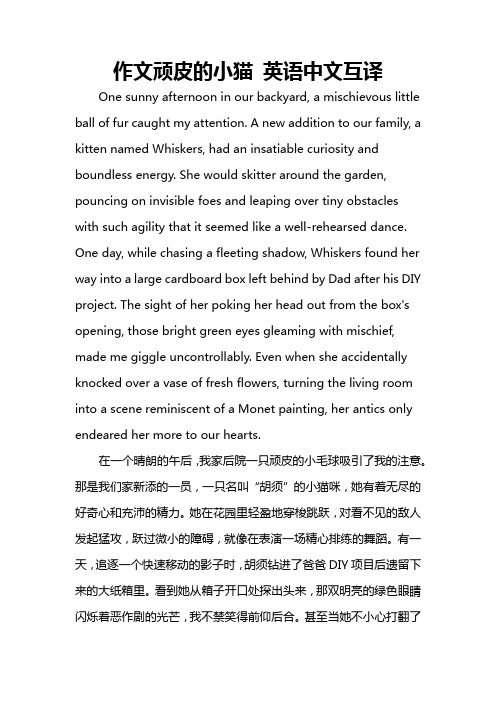
作文顽皮的小猫英语中文互译One sunny afternoon in our backyard, a mischievous little ball of fur caught my attention. A new addition to our family, a kitten named Whiskers, had an insatiable curiosity and boundless energy. She would skitter around the garden, pouncing on invisible foes and leaping over tiny obstacles with such agility that it seemed like a well-rehearsed dance. One day, while chasing a fleeting shadow, Whiskers found her way into a large cardboard box left behind by Dad after his DIY project. The sight of her poking her head out from the box's opening, those bright green eyes gleaming with mischief, made me giggle uncontrollably. Even when she accidentally knocked over a vase of fresh flowers, turning the living room into a scene reminiscent of a Monet painting, her antics only endeared her more to our hearts.在一个晴朗的午后,我家后院一只顽皮的小毛球吸引了我的注意。
猫和铃铛-儿童两分钟英语故事带翻译

猫和铃铛-儿童两分钟英语故事带翻译There were many mice in a house. The man of the house got a cat. The cat killed many of themice.Then the oldest mouse said,“All mice must come to myhole tonight, and we will think what wecan do about this cat.”All the mice came. Many mice spoke, but none knew what to do. At last a young mouse stoodup and said,“We must put abell on the cat. Then, when the cat comes near, we shall hear thebell and run away and hide. So the cat will not catch any more mice.”T hen the old mouse asked,“Who will put the bell on the cat?”No mouse answered.He waited, but still no one answered.At last he said,“It is not hard to say things; but it is harder to do them.”房子里有很多老鼠。
房主找来一只猫,这只猫吃掉了很多老鼠。
这时,最老的一只老鼠说:“今天晚上,所有的老鼠必须到我的洞里来,我们要想办法,来对付这只猫。
”所有的老鼠都来了。
很多老鼠都发言了,但是,谁也不知道该怎么办。
最后,有一只年轻的老鼠站起来说:“我们必须在猫的身上挂一个铃铛,这样一来,当猫走近时,我们听到铃声,就能够躲起来了,猫就再也抓不到老鼠了。
The cat and the bell猫和铃铛

The cat and the bell猫和铃铛(刘天渝)Look!Fat mice!They live in a house. It’s night.They looke for food ,(老鼠们)Apples,cookies and juice!(刘天渝)They have a big dinner!(苏俊熙孙浩宇)I like cheese!(黎靖博刘紫婷)I like fruit!(周宇轩)Hmm…..!Those mice!they are noisy!(旁白)The man gets a cat(任孜晗)Meow! I’m hungry.(苏俊熙)The cat!What shall we do!(孙浩宇)What shall we do!(黎靖博)Where is the cat ?(任孜晗)Meow!(老鼠们)It’s the cat! Run! Run! Run!(苏俊熙)What shall we do ?(孙浩宇)Let’s beat him up!(黎靖博)But the cat is too big !(刘紫婷)Then,What shall we do now!(苏俊熙)I don’t know!(孙浩宇)I know!Let’s put a bell on the cat !(黎靖博)Good idea!(刘紫婷)A bell ,It’s noisy!(孙浩宇)We can hear the bell!(老鼠们)Yeah! Good idea!(刘紫婷)Now…..Now!Who’s going to Put a bell on the cat!(苏俊熙)Oh , not me !(孙浩宇)Not me !(黎靖博)Not me !(刘紫婷)Me? Not me !(老鼠们)Too bad, Too bad!看,肥肥的老鼠们,他们住在一所房子里。
晚上到了,它们到处寻找食物,苹果,饼干,果汁!他们大吃一顿!我喜欢奶酪!我喜欢水果!哼,这些老鼠们太吵了!猫男主人得到了一只猫,喵!我好饿啊(猫想吃东西)那只猫我们怎么办呢?我们怎么办呢?猫在那里?喵….喵…猫来了,跑跑跑1我们怎么办呢?让我们把他打倒但是那只猫太大了我们现在怎么办呢?我不知道我知道!把铃铛系在猫的脖子上,好主意一个铃铛,有响声我们可以听到铃铛的声音耶!好主意现在…现在…谁来把这个铃铛系在猫的脖子上呢? 哦!我不去我不去,(哭)我不去,我?我可不去太糟糕了,太糟糕了。
初一英语小故事阅读带翻译

初⼀英语⼩故事阅读带翻译 学习英语,阅读真的很重要,多阅读⼀些简单的英语故事也是提⾼英语阅读能⼒的⼀种,下⾯店铺在这⾥整理了⼀些初⼀英语⼩故事给⼤家,希望⼤家会喜欢这些英⽂故事! 初⼀英语⼩故事篇⼀ Long ago, there was a big cat in the house. He caught many mice while they were stealing food. One day the mice had a meeting to talk about the way to deal with their common enemy. Some said this, and some said that. At last a young mouse got up, and said that he had a good idea. "We could tie a bell around the neck of the cat. Then when he comes near, we can hear the sound of the bell, and run away." Everyone approved of this proposal, but an old wise mouse got up and said, "That is all very well, but who will tie the bell to the cat?" The mice looked at each other, but nobody spoke. 从前,⼀所房⼦⾥⾯有⼀只⼤猫,他抓住了很多偷东西的⽼⿏。
⼀天,⽼⿏在⼀起开会商量如何对付他们共同的敌⼈。
会上⼤家各有各的主张,最后,⼀只⼩⽼⿏站出来说他有⼀个好主意。
“我们可以在猫的脖⼦上绑⼀个铃铛,那么如果他来到附近,我们听到铃声就可以马上逃跑。
小学三年级英语小故事
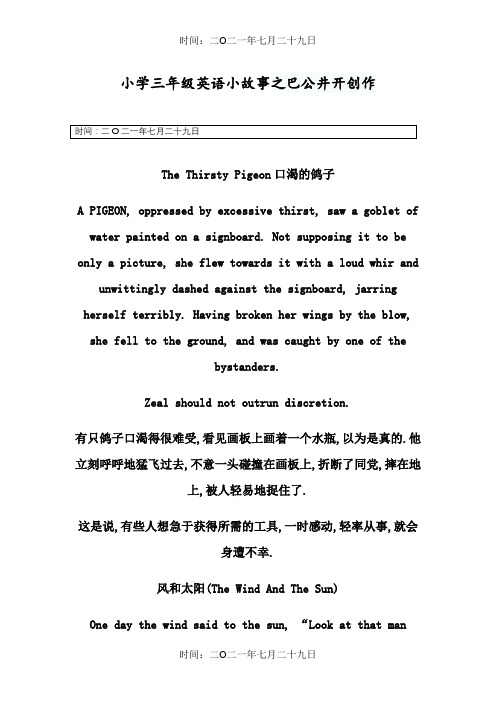
小学三年级英语小故事之巴公井开创作The Thirsty Pigeon口渴的鸽子A PIGEON, oppressed by excessive thirst, saw a goblet ofwater painted on a signboard. Not supposing it to be only a picture, she flew towards it with a loud whir and unwittingly dashed against the signboard, jarring herself terribly. Having broken her wings by the blow, she fell to the ground, and was caught by one of thebystanders.Zeal should not outrun discretion.有只鸽子口渴得很难受,看见画板上画着一个水瓶,以为是真的.他立刻呼呼地猛飞过去,不意一头碰撞在画板上,折断了同党,摔在地上,被人轻易地捉住了.这是说,有些人想急于获得所需的工具,一时感动,轻率从事,就会身遭不幸.风和太阳(The Wind And The Sun)One day the wind said to the sun, “Look at that manwalking along the road. I can get his cloak off morequickly than you can.”“We will see about that,” said the sun. “I will letyou try first.”So the wind tried to make the man take off his cloak. He blew and blew, but the man only pulled his cloak moreclosely around himself.“I give up,” said the wind at last. “I cannot get his cloak off.” Then the sun tried. He shone as hard as he could. The man soon became hot and took off his cloak. (有一天风跟太阳说: “看看那个沿着路上走的人.我可以比你快让他把披风脱下来.)(“我们等着看吧,”太阳说, “我让你先试.)(因此风检验考试让那个人把披风脱下来.他用力地吹,可是那个人把披风拉得更紧.)(“我放弃了,”风最后说, “我无法让他把披风脱下来.”然后由太阳试试看.他尽可能地晒他.不久,那个人很热就把披风脱下来了.)Little RobertLittle Robert asked his mother for two cents. "What did you do with the money I gave you yesterday?""I gave it to a poor old woman," he answered. "You're a good boy," said the mother proudly. "Here aretwo centsmore. But why are you so interested in the old woman?""She is the one who sells the candy."好孩子小罗伯特向妈妈要两分钱.“昨天给你的钱干什么了?”“我给了一个可怜的老太婆,”他回答说. “你真是个好孩子,”妈妈骄傲地说.“再给你两分钱.可你为什么对那位老太太那么感兴趣呢?”“她是个卖糖果的.”Belling the catlong ago,there was a big cat in the house.He caught many mice while they were stealing food.One day the mice bad a meeting to talk about the way todeal withtheir common enemy.Some said this,andsome said that.At last a young mouse got up,and said that he had a goodidea.“We could tie a bell around the neck of the cat.Then when he comes near,we can hear the sound of the bell,andrun away.”Everyone approved of this proposal,but an old wise mouse got up and said,“That is all very well,but who will tie the bell to the cat?”The mice looked at each other,butnobody spoke.给猫挂铃铛很久以前,房子里有只年夜猫.他抓住了许多偷吃粮食的老鼠.一天,老鼠们开会讨论凑合猫的法子.有的说这样,有有的说那样.最后一只小老鼠站起来,说他有一个好法子:我们给猫的脖子上拴一个铃当,当猫走近的时候,我们就可以听到铃声,就可以逃跑了.每个老鼠都同意这个建议,可是一只老老鼠站起来说:那谁去给猫戴上铃当呢?老鼠们你看我,我看你,没人作声了.。
小野猫把铃铛英文理解文言文的作文

小野猫把铃铛英文理解文言文的作文The world we live in is a complex and ever-evolving place, filled with both beauty and challenges. As individuals, we each have our own unique experiences, perspectives, and goals that shape the way we navigate this landscape. However, there are certain universal truths that transcend our individual differences and connect us as a global community.One of the most fundamental of these truths is the importance of embracing diversity. In a world that is becoming increasingly interconnected, it is crucial that we learn to appreciate and celebrate the differences that make each person and culture unique. Whether it is the vibrant traditions of a distant land, the unique dialects and languages that have evolved over centuries, or the diverse array of perspectives and lived experiences that people bring to the table, diversity is a source of richness and strength.By opening ourselves up to the perspectives of others, we not only broaden our own understanding of the world but also cultivate a deeper sense of empathy and compassion. When we take the time to listen to and learn from those who are different from us, we begin to see the world through a new lens, one that is often more nuanced,complex, and beautiful than the one we had previously known.Moreover, diversity is not just a matter of cultural or ethnic differences – it also encompasses a wide range of individual characteristics, such as age, gender, sexual orientation, socioeconomic status, and physical and cognitive abilities. By embracing the diversity of the human experience, we can create a more inclusive and equitable society that celebrates the unique contributions of all its members.Of course, embracing diversity is not always easy. It can be challenging to step outside of our comfort zones and engage with perspectives and experiences that are vastly different from our own. It requires a willingness to be open-minded, to challenge our own biases and assumptions, and to engage in difficult conversations that may push us outside of our intellectual and emotional boundaries.However, the rewards of this effort are immense. When we learn to appreciate and celebrate diversity, we not only enrich our own lives but also contribute to the creation of a more just, compassionate, and vibrant world. By fostering a culture of inclusion and respect, we can break down the barriers that divide us and work together to tackle the complex challenges that we face as a global community.One of the most powerful ways to promote diversity and inclusion isthrough education. By exposing young people to a wide range of perspectives and experiences, we can help them develop the critical thinking skills and cultural competencies that are essential for navigating an increasingly diverse world. This can take many forms, from incorporating diverse literature and media into the curriculum to providing opportunities for cross-cultural exchange and collaboration.Moreover, education is not just about what happens in the classroom – it is also about the values and attitudes that we cultivate within our communities and institutions. By modeling a commitment to diversity and inclusion, and by holding ourselves and others accountable for creating inclusive and equitable environments, we can help to shape a more just and compassionate world.Ultimately, the embrace of diversity is not just a moral imperative – it is also a practical necessity for the continued growth and prosperity of our global community. In a world that is increasingly interconnected and interdependent, our ability to work together across differences will be essential for tackling the complex challenges that we face, from climate change and global health crises to economic inequality and social unrest.By cultivating a culture of mutual understanding, respect, and collaboration, we can harness the power of our diversity to create amore sustainable, equitable, and fulfilling future for all. This is not an easy task, but it is one that is essential for the well-being of our planet and all its inhabitants. Let us, therefore, commit ourselves to the ongoing work of embracing diversity and building a more just and inclusive world.。
初一英语小故事

初一英语小故事XXX to find a way to。
the cat。
One mouse suggestedputting a bell around the cat's neck so they could hear him coming。
All the mice agreed it was a good idea。
but who would bell the cat。
They all fell silent。
realizing the danger of the task。
It's easy to XXX.很久以前,有一只大猫住在房子里.他抓了很多偷吃食物的老鼠.老鼠们开会商量如何制止这只猫.有一只老鼠建议给猫的脖子上戴个铃铛,这样他们就能听到猫的脚步声.所有的老鼠都认为这是个好主意,但是谁去给猫戴铃铛呢?他们都沉默了下来,意识到这项任务的危险性.提出不可能的解决方案是很容易的.The Importance of Setting Goals设定目标的重要性XXX success in any aspect of life。
Without clear goals。
it is easy to XXX nless。
and to XXX even when making progress。
By setting specific。
measurable goals。
individuals can create a roadmap for their personal and nal growth.设定目标对于在生活的任何方面取得成功都至关重要。
没有明确的目标,很容易迷失或失去方向,即使在取得进展时也会感到不满足。
通过设定具体、可衡量的目标,个人可以为自己的个人和职业成长制定一张路线图。
When setting goals。
it is important to make them XXX disappointment。
谁去挂一个铃铛英文手打版本配中文翻译
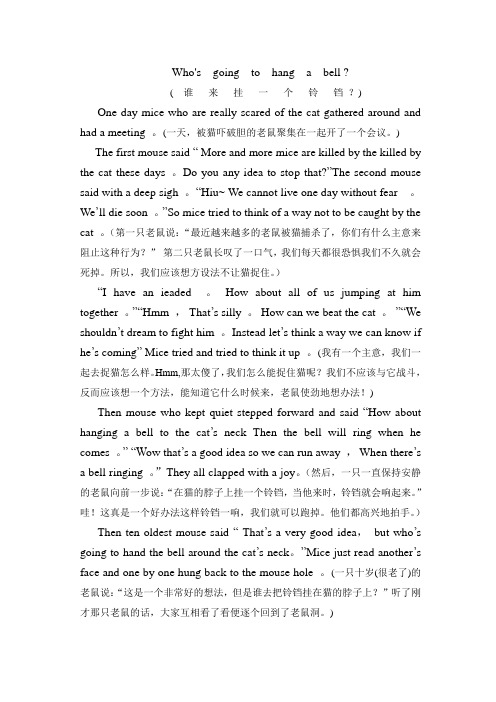
Who's going to hang a bell ?( 谁来挂一个铃铛?) One day mice who are really scared of the cat gathered around and had a meeting 。
(一天,被猫吓破胆的老鼠聚集在一起开了一个会议。
) The first mouse said “ More and more mice are killed by the killed by the cat these days 。
Do you any idea to stop that?”The second mouse said with a deep sigh 。
“Hiu~ We cannot live one day without fear 。
We’ll die soon 。
”So mice tried to think of a way not to be caught by the cat 。
(第一只老鼠说:“最近越来越多的老鼠被猫捕杀了,你们有什么主意来阻止这种行为?”第二只老鼠长叹了一口气,我们每天都很恐惧我们不久就会死掉。
所以,我们应该想方设法不让猫捉住。
)“I have an ieaded 。
How about all of us jumping at him together 。
”“Hmm ,That’s silly 。
How can we beat the cat 。
”“W e shouldn’t dream to fight him 。
Instead let’s think a way we can know if he’s coming” Mice tried and tried to think it up 。
(我有一个主意,我们一起去捉猫怎么样。
Hmm,那太傻了,我们怎么能捉住猫呢?我们不应该与它战斗,反而应该想一个方法,能知道它什么时候来,老鼠使劲地想办法!) Then mouse who kept quiet stepped forward and said “How about hanging a bell to the cat’s neck Then the bell will ring when he comes 。
铃铛猫的作文
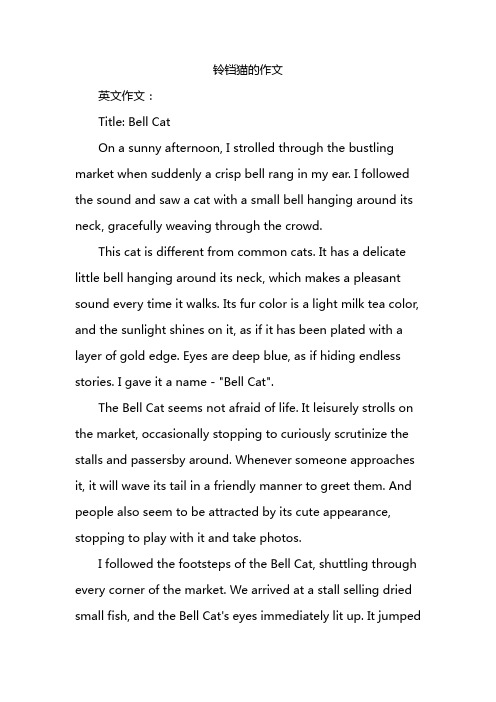
铃铛猫的作文英文作文:Title: Bell CatOn a sunny afternoon, I strolled through the bustling market when suddenly a crisp bell rang in my ear. I followed the sound and saw a cat with a small bell hanging around its neck, gracefully weaving through the crowd.This cat is different from common cats. It has a delicate little bell hanging around its neck, which makes a pleasant sound every time it walks. Its fur color is a light milk tea color, and the sunlight shines on it, as if it has been plated with a layer of gold edge. Eyes are deep blue, as if hiding endless stories. I gave it a name - "Bell Cat".The Bell Cat seems not afraid of life. It leisurely strolls on the market, occasionally stopping to curiously scrutinize the stalls and passersby around. Whenever someone approaches it, it will wave its tail in a friendly manner to greet them. And people also seem to be attracted by its cute appearance, stopping to play with it and take photos.I followed the footsteps of the Bell Cat, shuttling through every corner of the market. We arrived at a stall selling dried small fish, and the Bell Cat's eyes immediately lit up. It jumpedonto the booth, lightly sniffed the dried fish, and then turned back to look at me, with anticipation in its eyes. I bought some dried fish with a smile and handed it to it. It happily started eating, making a satisfying gurgling sound while eating.The market gradually dissipated, and the setting sun filled the earth. I held the bell cat and sat on a bench, enjoying this rare peaceful time. The Bell Cat lay on my lap, closed its eyes, as if enjoying the tranquility. I looked at its peaceful appearance and felt warm in my heart.After an unknown amount of time, the Bell Cat suddenly stood up, shook its fur, and then jumped to the ground. It looked back at me with gratitude in its eyes, and then disappeared into the afterglow of the sunset.中文作文:标题:铃铛猫在一个充满阳光的午后,我漫步在熙熙攘攘的市集,耳边突然传来一阵清脆的铃声。
幼儿童话(猫和铃铛)The cat and the bell

道具:头饰 ,录音,铃铛,小桌子,老鼠洞门,苹果、饼干、旁白:Look ! Fat mouse ! They live in a house. It’s night .They look for food.Mice: Apples ,cookies and juice.旁白:They have a big dinner.Mouse1: I like cheese.Mouse2:I like fruit.Man: Hmm, those mice. They are noisy .I need a cat.旁白:The man gets a cat.Cat: Meow! I’m hungry!(要凶狠)Mouse1:The cat! What shall we do?(害怕)Mouse2:What shall we do ?Mouse3: Where is the cat?Cat: Meow!(凶)Mice:It’s the cat! Run ,run ,run!(紧张的表情加动作逃回老鼠洞) Mouse1: What shall we do ?Mouse2:Let’s beat him up.(勇敢)Mouse3:But the cat is too big !Mouse4:Then, what shall we do?Mouse1:I don’t know.Mouse2:I know. Let’s put a bell on the cat!Mouse1:Good idea!Mouse3:A bell? It’s noisy!Mouse4:We can hear the bell.Mice: Yeah! Good idea!Mouse4:Now,now,who’s going to put the bell on the cat? Mouse 1:Oh,not me !Mouse3:Not me !(害羞)Mouse4:Not me !(哭)Mouse2:Me?Not me !Mice: Too bad! Too bad!。
给猫脖子上挂铃铛小学英语作文带翻译
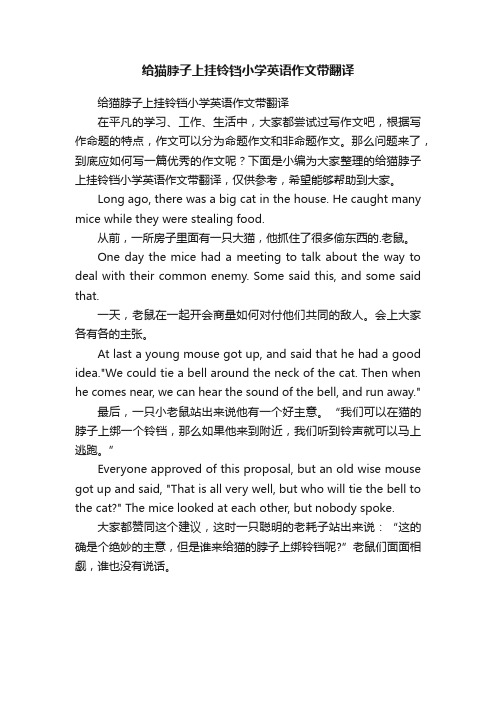
给猫脖子上挂铃铛小学英语作文带翻译给猫脖子上挂铃铛小学英语作文带翻译在平凡的学习、工作、生活中,大家都尝试过写作文吧,根据写作命题的特点,作文可以分为命题作文和非命题作文。
那么问题来了,到底应如何写一篇优秀的作文呢?下面是小编为大家整理的给猫脖子上挂铃铛小学英语作文带翻译,仅供参考,希望能够帮助到大家。
Long ago, there was a big cat in the house. He caught many mice while they were stealing food.从前,一所房子里面有一只大猫,他抓住了很多偷东西的.老鼠。
One day the mice had a meeting to talk about the way to deal with their common enemy. Some said this, and some said that.一天,老鼠在一起开会商量如何对付他们共同的敌人。
会上大家各有各的主张。
At last a young mouse got up, and said that he had a good idea."We could tie a bell around the neck of the cat. Then when he comes near, we can hear the sound of the bell, and run away."最后,一只小老鼠站出来说他有一个好主意。
“我们可以在猫的脖子上绑一个铃铛,那么如果他来到附近,我们听到铃声就可以马上逃跑。
”Everyone approved of this proposal, but an old wise mouse got up and said, "That is all very well, but who will tie the bell to the cat?" The mice looked at each other, but nobody spoke.大家都赞同这个建议,这时一只聪明的老耗子站出来说:“这的确是个绝妙的主意,但是谁来给猫的脖子上绑铃铛呢?”老鼠们面面相觑,谁也没有说话。
初一英语小故事阅读带翻译

初一英语小故事阅读带翻译学习英语,阅读真的很重要,多阅读一些简单的英语故事也是提高英语阅读能力的一种,下面店铺在这里整理了一些初一英语小故事给大家,希望大家会喜欢这些英文故事!初一英语小故事篇一Long ago, there was a big cat in the house. He caught many mice while they were stealing food.One day the mice had a meeting to talk about the way to deal with their common enemy. Some said this, and some said that.At last a young mouse got up, and said that he hada good idea."We could tie a bell around the neck of the cat. Then when he comes near, we can hear the sound of the bell, and run away."Everyone approved of this proposal, but an old wise mouse got up and said, "That is all very well, but who will tie the bell to the cat?" The mice looked at each other, but nobody spoke.从前,一所房子里面有一只大猫,他抓住了很多偷东西的老鼠。
一天,老鼠在一起开会商量如何对付他们共同的敌人。
会上大家各有各的主张,最后,一只小老鼠站出来说他有一个好主意。
“我们可以在猫的脖子上绑一个铃铛,那么如果他来到附近,我们听到铃声就可以马上逃跑。
英语学习资料:幼儿英语话剧剧本:猫和铃铛

英语学习资料:幼儿英语话剧剧本:猫和铃铛幼儿英语话剧剧本:猫和铃铛 Scene I(Look!Fat mice! They live in a house.It`s night. They look for food.)看!一群肥老鼠!他们住在一所大房子里。
到晚上了。
他们到处寻找食物。
Mice:Apples,cookies and juice!老鼠们:苹果,饼干和果汁!(They have a big dinner.他们大吃了一顿。
)Mouse1:I like cheese.老鼠1:我喜欢奶酪.Mouse2:I like fruit.老鼠2:我喜欢水果。
Man:Hmm,those mice.They are noisy.I need a cat.男主人:嗯,那些老鼠。
他们太吵闹了!我需要一只猫。
(The man gets a cat.男主人得到了一只猫。
)Cat:Meow!I am hungry!猫:喵!我饿了!Mouse1:That cat!What shall we do?老鼠1:那只猫!我们怎么办呀?Mouse2:What shall we do ?老鼠2:我们怎么办?Mouse3:Where is the cat?老鼠3:那只猫呢?Cat:Meow!猫:喵!Mice:It`s the cat!Run!Run!Run! 老鼠:一只猫!跑!跑!跑!Mouse1:What shall we do?老鼠1:我们怎么办呀?Mouse2:Let`s beat him up.老鼠2:让我们打到他。
Scene IIMouse3:But the cat is too big! 老鼠3:但是那只猫太大了。
Mouse4:Then,what shall we do? 老鼠4:然后,我们怎么办?Mouse1:I don`t know.老鼠1:我不知道。
Mouse5:I know!Let`s put a bell on the cat!老鼠5:我知道!让我们把铃铛放在猫的身上!Mouse1:Good idea!老鼠1:好主意!Mouse2:A bell?It`s noisy!老鼠2:一个铃铛?那太吵了!Mouse3:We can hear the bell.老鼠3:我们能听见铃铛。
Belling the Cat 给猫系铃铛

伊索寓言双语小故事:替猫戴上铃铛伊索寓言故事之替猫戴上铃铛,这个寓言故事告诉我们,如果无法实施,一个好的计划一点用处也没有。
还告诉我们事情都是说起来容易做起来难。
Belling the Cat 替猫戴上铃铛Kitty the Cat is eating all the mice. The mice are afraid to come out of their mouseholes.猫咪凯蒂几乎吃光了所有的老鼠。
老鼠们都非常害怕,不敢踏出鼠洞半步。
Kitty: Meow…I got you, little mouse.凯蒂:喵呜……我抓住你了,小老鼠。
Little Joe: Oh, please, Kitty! Let me go. I am too small to eat.小乔伊:哦,求求你了,凯蒂!放我走吧。
我太小了,不够你吃的。
Kitty: I don’t mind. I am very hungry right now. (gulp!)凯蒂:没关系。
我现在太饿了。
(一口吞下小老鼠!)Kitty the Cat eats poor Little Joe and looks around for another mouse.猫咪凯蒂吃掉了可怜的小乔伊。
又继续四处寻找其他的老鼠。
Kitty: That was delicious. But I’m still not full. I need another one. Meow…凯蒂:味道真不错。
可是我还是没饱,我得再找一只。
喵呜……Lenny and Theodore are also mice. They see everything.伦尼和西奥多也是老鼠,他们目睹了这一切。
Lenny: Did you see that, Theodore?伦尼:你看到了吗,西奥多?Theodore: I sure did, Lenny. It was terrible.西奥多:我看到了,伦尼。
- 1、下载文档前请自行甄别文档内容的完整性,平台不提供额外的编辑、内容补充、找答案等附加服务。
- 2、"仅部分预览"的文档,不可在线预览部分如存在完整性等问题,可反馈申请退款(可完整预览的文档不适用该条件!)。
- 3、如文档侵犯您的权益,请联系客服反馈,我们会尽快为您处理(人工客服工作时间:9:00-18:30)。
少儿英语小短文带翻译:替猫戴上铃铛
Kitty the Cat is eating all the mice. The mice are afraid to come out of their mouseholes.
猫咪凯蒂几乎吃光了所有的老鼠。
老鼠们都非常害怕,不敢踏出
鼠洞半步。
Kitty:Meow… I got you, little mouse.
凯蒂:喵呜……我抓住你了,小老鼠。
Little Joe: Oh, please, Kitty! Let me go. I am too small to eat.
小乔伊:哦,求求你了,凯蒂!放我走吧。
我太小了,不够你吃的。
Kitty:I don’t mind. I am very hungry right now. (gulp!)凯蒂:没关系。
我现在太饿了。
(一口吞下小老鼠!)
Kitty the Cat eats poor Little Joe and looks around for another mouse.
猫咪凯蒂吃掉了可怜的小乔伊。
又继续四处寻找其他的老鼠。
Kitty:That was delicious. But I’m still not full. I need another one. Meow…
凯蒂:味道真不错。
不过我还是没饱,我得再找一只。
喵呜……
Lenny and Theodore are also mice. They see everything.
伦尼和西奥多也是老鼠,他们目睹了这个切。
Lenny: Did you see that, Theodore?
伦尼:你看到了吗,西奥多?
Theodore: I sure did, Lenny. It was terrible.
西奥多:我看到了,伦尼。
太可怕了。
Lenny: Kitty is getting fatter and fatter every day. She is eating more and more.
伦尼:凯蒂一天比一天胖。
她越吃越多。
Theodore: Soon she will eat all of us. We need to do something.
西奥多:很快她就会把我们都吃光。
我们必须采取行动。
Lenny:You’re right. But what can we do?
伦尼:你说得对。
但是我们该怎么做呢?
Theodore:Let’s have a meeting first. Tell all the mice to come to my house tonight.
西奥多:我们先开个会。
告诉所有的老鼠今晚到我家来。
Lenny:Don’t worry. I’ll tell everyone to come. We’ll all be there.
伦尼:你放心吧。
我去叫所有的人来。
我们大家都会到。
Just then, Kitty smells the two mice and slowly walks towards them.
正在这时,凯蒂闻到了这两只老鼠的味道,慢慢地向他们走过来。
Theodore: Quickly, Lenny! Hide! Kitty is coming this way!
西奥多:快,伦尼!躲起来!凯蒂朝这边走过来了!
Kitty:Meow… I smell mice. Where are they?
凯蒂:喵呜……我闻到了老鼠的味道。
你们在哪儿?
This time the two mice are lucky. They get away from
Kitty. Late in the evening, all the mice are gathered at Theodore’s house for the meeting. 这回两只老鼠还算幸运,他们
逃过了凯蒂的利爪。
傍晚,所有的老鼠都聚集到西奥多家,准备开会。
Theodore: Good evening, everyone. Thank you all for coming.
西奥多:各位晚上好。
感谢你们的光临。
Mr. Toby:What’s up, Theo? Why did you call us so late?
托比先生:怎么了,小西?为什么这么晚叫我们来?
Lenny: Well, Mr. Toby, today Kitty got little Joe.
伦尼:哦,托比先生,今天凯蒂吃掉了小乔伊。
Mr. Toby: Not again! Are you sure?
托比先生:哦,不!你确定吗?
Lenny: Yes, Theodore and I saw it together. It was
really terrible.
伦尼:当然,西奥多和我亲眼看到的。
真的是太可怕了。
Theodore: We must stop this now!!!
西奥多:现在我们必须阻止这种事情的发生!!!
Lenny:If we don’t, we’ll all be eaten, too.
伦尼:如果不采取行动,总有一天我们都会被吃掉的。
Mr. Toby: I agree with you. But what can we do? We are
so small and helpless.。
